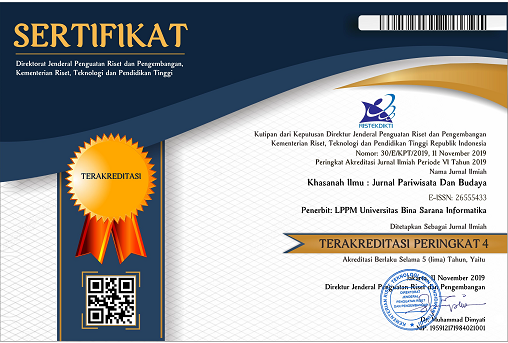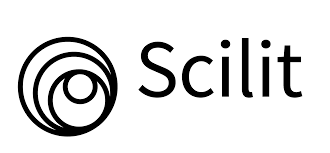Pemahaman Konsep Hospitality Pada Pelaku Pariwisata di Kabupaten Berau
Sari
Keywords: hospitality, tourism stakeholders, Berau
Abstrak: Sebagai destinasi wisata, Kabupaten Berau mengalami kenaikan kunjungan wisatawan yang cukup mengesankan pada beberapa tahun terakhir. Pengembangan pariwisata di Kabupaten Berau masih menemui beberapa kendala, antara lain masih rendahnya kualitas pengelolaan destinasi wisata, belum optimalnya pengelolaan budaya daerah dan promosi destinasi pariwisata yang belum optimal. Industri pariwisata lekat dengan keramahtamahan atau hospitality yang merupakan keunggulan utama dari industri lainnya. Sehingga terdapat kebutuhan untuk mengeksplorasi persepsi pelaku pariwisata tentang konsep hospitality. Tujuan dari penelitian ini adalah untuk menganalisis tingkat pemahaman konsep hospitality pada pelaku pariwisata di Kabupaten Berau. Penentuan responden dilakukan melalui metode purposive sampling dan snowball sampling. Responden dipilih dengan pertimbangan yang bersangkutan memiliki pengalaman dan pengetahuan sesuai dengan fokus penelitian. Data yang terkumpul dianalisis dengan cara deskriptif naratif hasil wawancara dengan narasumber dan hasil observasi. Hasil dari penelitian menunjukkan bahwa pelaku pariwisata lebih memahami konsep layanan daripada hospitality. Mayoritas pelaku pariwisata tidak dapat secara akurat menggambarkan hospitality atau membedakannya dari layanan. Hanya sedikit dari pelaku pariwisata yang mampu mendefinisikan dan menggambarkan konsep hospitality, namun ini pun masih mengacu pada istilah dan konsep manajemen layanan. Sebagian besar pelaku pariwisata berjuang untuk mengungkapkan pemahaman dan persepsi tentang hospitality. Praktik yang konsisten dalam menjalankan konsep hospitality dapat memengaruhi perilaku dari pelaku pariwisata.
Kata kunci: hospitality, pelaku pariwisata, Berau
Teks Lengkap:
PDFReferensi
Cook, R. A., Hsu, C. H. C., & Taylor, L. L. (2018). Tourism: The Business of Hospitality and Travel, 6th Edition. Edinburgh Gate Harlow: Pearson.
Cooper, C., Fletcher, J., Fyall, A., Gilbert, D., & Wanhill, S. (2008). Tourism: Principles and Practice. New Jersey: Financial Times/Prentice Hall.
Crotts, J. C., Dickson, D. R., & Ford, R. C. (2005). Aligning organizational processes with mission: The case of service excellence. Academy of Management Perspectives, 19(3), 54–68. https://doi.org/10.5465/ame.2005.18733215
Gazali, M. (2017). Penguatan Ekonomi Masyarakat Kabupaten Berau Bidang Industri Pariwisata Tahun 2018.
Grönroos, C. (2011). Value co-creation in service logic: A critical analysis. Marketing Theory, 11(3), 279–301. https://doi.org/10.1177/1470593111408177
Holloway, C., & Taylor, N. (2006). The Business of Tourism (7th ed.). New Jersey: Pearson.
Johanson, M. M., & Woods, R. H. (2008). Recognizing the emotional element in service excellence. Cornell Hospitality Quarterly, 49(3), 310–316. https://doi.org/10.1177/1938965508316267
Kandampully, J., & Solnet, D. (2015). Service Management Principles for Hospitality and Tourism (2nd ed.). Des Moines, IA: Kendall Hunt.
Kementerian Pariwisata Republik Indonesia. (2017). Laporan Akuntabilitas Kinerja Kementerian Pariwisata Tahun 2017. Jakarta.
Kernbach, S., & Schutte, N. S. (2005). The impact of service provider emotional intelligence on customer satisfaction. Journal of Services Marketing, 19(7), 438–444. https://doi.org/10.1108/08876040510625945
Kotler, P., & Keller, K. L. (2015). Marketing Management. Prentice Hall (15th ed.). New Jersey: Pearson. https://doi.org/10.1177/1060028014534195
Kristiana, Y., & Nathalia, T. C. (2017). Tourism Stakeholders: Towards Sustainable Tourism Development. In 15th APacCHRIE Conference. Denpasar: International Bali Institute of Tourism.
Langhorn, S. (2004). How emotional intelligence can improve management performance. International Journal of Contemporary Hospitality Management, 16(4), 220–230. https://doi.org/10.1108/09596110410537379
Lashley, C. (2000). Towards A Theoretical Understanding, in Lashley, C. and Morrison, A. (Eds). In Search of Hospitality: Theoretical Perspectives and Debates (pp. 1–17). Oxford: Butterworth-Heinemann.
Lashley, C. (2007). Discovering hospitality: observations from recent research. International Journal of Culture, Tourism and Hospitality Research, 1(3), 214–226. https://doi.org/10.1108/17506180710817747
Mann, S. (1999). Emotion at Work: To What Extent are We Expressing, Suppressing, or Faking It? European Journal of Work and Organizational Psychology, 8(3), 347–369. https://doi.org/10.1080/135943299398221
Meyer, D. (2008). Setting the Table: The Transforming Power of Hospitality in Business. New York: HarperCollins Publishers.
Moleong, L. J. (2010). Metodologi Penelitian Kualitatif. Bandung: PT Remaja Rosdakarya.
Pezzotti, G. (2011). The Essence of Hospitality and Service, in Sturman, M.C., Corgel, J.B. and Verma, R. (Eds). In The Cornell School of Hotel Administration on Hospitality: Cutting Edge Thinking and Practice (pp. 5–18). New Jersey: John Wiley & Sons.
Pizam, A. (2005). International Encyclopedia of Hospitality Management. Butterworth-Heinemann: Elsevier Oxford.
Popova, D. (2012). Hospitality Management (Lecture notes).
Ritzer, G. (2007). Inhospitable hospitality?, in Lynch, P., Morrison, A. and Lashley, C. (Eds). In Hospitality: A Social Lens (pp. 129–139). Amsterdam: Elsevier.
Sugiyono. (2016). Metode Penelitian Kuantitatif, Kualitatif dan R&D. Bandung: Alfabeta.
Teng, C. C. (2011). Commercial hospitality in restaurants and tourist accommodation: Perspectives from international consumer experience in Scotland. International Journal of Hospitality Management, 30(4), 866–874. https://doi.org/10.1016/j.ijhm.2011.01.007
Varca, P. E. (2004). Service skills for
DOI: https://doi.org/10.31294/khi.v10i1.5625










